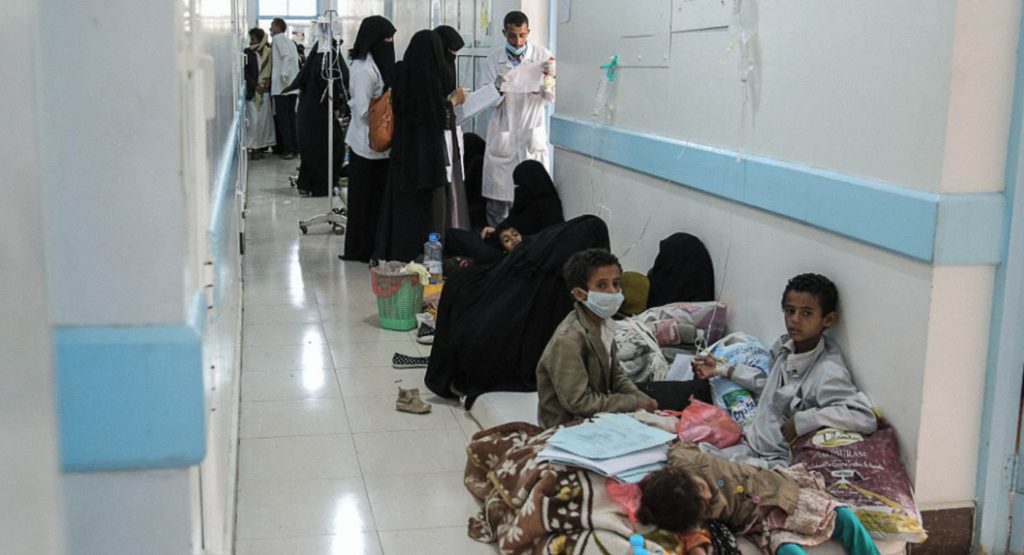Yemen: The Poorest Arab Country Facing War, Epidemics and Poverty (DER SPIEGEL)
YemenExtra
The German newspaper “DER SPIEGEL” spoke about the catastrophic situation in war-torn Yemen, which is under brutal attack by the Saudi regime as well as Corona. The newspaper wrote: “War and poverty, and now Corona,” adding, “This epidemic is killing with all of its power in the poorest country in the Arab world.”
The author of the report went on, describing the dire situation of the Yemeni population, and gave an example of a man named “Salem” who has no other choice, as a father, but to take his sick child to the clinic, as he fears being infected with the Coronavirus. If he does not see a doctor urgently, his sick child might lose his sight.
This 45-year-old man explains the situation to Save the Children Fund staff, saying: “Many families have locked themselves in the house because of this epidemic, but what benefit does this have when a child dies as a result of the bombing or because he was unable to go to a hospital.”
The United Nations has classified Yemen as the world’s largest humanitarian catastrophe. For more than five years, this poorest country in the Arab world has faced a deadly mixture of war, poverty, hunger and disease. More than 24 million people, or about 80 percent of the population, need help. For most of them, there is no other way to survive than to get aid.
Malnutrition is especially prevalent in this country. Hunger is widespread in large parts of Yemen. The UN World Food Program alone is feeding about 12 million Yemenis.
Certainly, the financial aid for Yemen has decreased dramatically, and at a recent meeting, only $ 1.3 billion was raised, while the country requires at least $ 2.4 billion dollars to properly help the people in this country.
It is almost impossible to obtain food from the market for most Yemenis. That is because food costs have also risen sharply, the value of the country’s currency has declined, and many jobs were lost.
The Aid agencies in Yemen always talk about helpless mothers who can no longer breastfeed their children. They also speak of frustrated Yemeni men shedding tears, because they do not know how to obtain their next family meal.
In these circumstances, it is not surprising that the Corona crisis has ravaged this region with all its might. Of course, only 1,600 Corona cases have been reported in the country so far, but experts stress that the official statistics are not realistic due to the inability to conduct Corona tests in the country. Also, statistics indicate that the burial rates in Yemeni cemeteries have increased significantly compared to the stage that preceded the outbreak of the Corona crisis.
There are many reasons for this. Whereas, the Yemeni health care system has been significantly deteriorated by the long-term war. Many hospitals have been destroyed. Patients rarely go to the few hospitals left that still operate.
Moreover, Most Yemeni patients only decide to go to hospitals for treatment if their lives are at risk. Many patients also do not go to the hospital due to the fear of being infected with the coronavirus. Health measures such as frequent hand washing and social separation can rarely be implemented.
“It is impossible to maintain social separation in Yemen. People cannot stay at home and they must go out to work for their next meals to feed their families,” said Jean-Nicolas Beuze., UNHCR representative in Yemen.
He added in an interview with the German newspaper “DER SPIEGEL”: “The situation is very difficult for millions of Yemeni refugees. Often, many families who lost or abandoned their homes due to the war live in confined spaces and tents. They do not have access to water and sanitation, and therefore they cannot protect themselves”.
The German newspaper also added in its report about how this epidemic and the lack of medical capabilities have had severe consequences, especially for Yemeni children. Save the Children announced that the number of visits to receive services for children decreased by more than 80% between January and April.
The writer of the report noted that many Yemeni children suffer from acute malnutrition, as he said: “This makes them particularly vulnerable to this virus.”
According to the evaluation of the Save the Children Fund, Corona has not yet reached its peak in Yemen.
Read More:
PM Requests the UN to Take Critical Measurements Against Saudi Escalation

